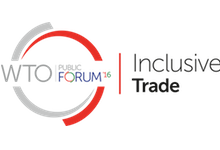The impact of digital technologies on trade in professional services
28 Sep 2016 13:00h - 14:30h
Event report
[Read more session reports and live updates from the 2016 WTO Public Forum.]
Organised by the Law Society of England and Wales, and the European Services Forum, and moderated by Carolyn Thurston Smith, Policy Adviser at the Law Society of England and Wales, this session sought to explore the impact of digital technologies on trade, especially in two sectors of activities: law and accountancy.
Iain Sandford, Partner at Sidley Austin LLP, highlighted the challenges lawyers face daily in helping clients avoid problems and find solutions. From this perspective, he explained how innovation and technologies create efficiencies in delivering his work, but he also underlined the risks that they imply. Indeed, technology improves collaboration between lawyers who keep in electronic touch with their clients quite possibly located in another country (i.e., e-mails or Dropbox); it facilitates the transfer of a huge amount of material between parties; and it provides a new way to collaborate with management tools. However, lawyers might share sensitive information that belong to their clients and that needs to be protected and remain confidential. Thus more and more clients impose limitations on where information can be stored.
David Gruner, Manager, Global Public Policy, DTTL and Manager, Customs and Global Trade, Deloitte Sweden, explained that trade is really about a multitude of tasks in a global vision to deliver something. He underscored the importance of digital technologies in facilitating the growth of the services industry. A lot of issues that lawyers deal with are related to regulatory framing, which complicates negotiations. He emphasised the importance of three key elements in trade and accountancy: regulations that maintain a certain level of coordination in international dialogue; sharing of data and information; and talented people who should have the opportunity to assert their qualifications in every jurisdiction.
Pascal Kerneis, Managing Director at the European Services Forum, noted the importance of services in the legal and accountancy sector. From a professional perspective, he underlined the need to reflect on the impact of digital trade, considering that countries sometimes do not fully understand the implications of the provision of simple services such as those offered by Skype. He explained that one essential aspect in international trade related accountancy is to know where the transaction is done and where the money comes from. He also noted the importance of a global perspective where services can be provided without barriers, in order to facilitate transactions, and where individuals’ professional qualifications are recognised in other countries.
Hamid Mamdouh, Director of the Trade in Services and Investment Division at the WTO, presented some of the issues that are addressed by the WTO in terms of professional qualifications recognition. From the General Agreement on Tariffs and Trade (GATT) perspective, there is a need to look at the professional market within national limitations in order to provide equal possibilities and consistency. When it comes to qualifications requirements, the national treatment standard needs to be complied with.
Measures such as licensing requirements, procedures, and technical standards can become unnecessary barriers and this is part of the WTO specifications. GATT contains a provision on recognition (article 7) and provides that members are allowed to engage recognition arrangements. However, he underlined that that such an arrangement cannot be used as a means of discrimination in the application of individual substantive standards, and these have to remain the same. He concluded by noting that professional qualifications continue to be relevant in the context of the evolution of technology and digital solutions; these can be used to improve work efficiency, but individuals still need to be recognised as qualified workers in order to be able to start working.
by Ana Andrijević
Related topics
Related event

